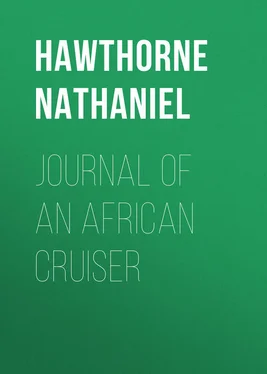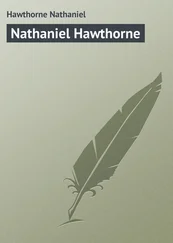Nathaniel Hawthorne - Journal of an African Cruiser
Здесь есть возможность читать онлайн «Nathaniel Hawthorne - Journal of an African Cruiser» — ознакомительный отрывок электронной книги совершенно бесплатно, а после прочтения отрывка купить полную версию. В некоторых случаях можно слушать аудио, скачать через торрент в формате fb2 и присутствует краткое содержание. Жанр: literature_19, foreign_antique, foreign_prose, на английском языке. Описание произведения, (предисловие) а так же отзывы посетителей доступны на портале библиотеки ЛибКат.
- Название:Journal of an African Cruiser
- Автор:
- Жанр:
- Год:неизвестен
- ISBN:нет данных
- Рейтинг книги:5 / 5. Голосов: 1
-
Избранное:Добавить в избранное
- Отзывы:
-
Ваша оценка:
- 100
- 1
- 2
- 3
- 4
- 5
Journal of an African Cruiser: краткое содержание, описание и аннотация
Предлагаем к чтению аннотацию, описание, краткое содержание или предисловие (зависит от того, что написал сам автор книги «Journal of an African Cruiser»). Если вы не нашли необходимую информацию о книге — напишите в комментариях, мы постараемся отыскать её.
Journal of an African Cruiser — читать онлайн ознакомительный отрывок
Ниже представлен текст книги, разбитый по страницам. Система сохранения места последней прочитанной страницы, позволяет с удобством читать онлайн бесплатно книгу «Journal of an African Cruiser», без необходимости каждый раз заново искать на чём Вы остановились. Поставьте закладку, и сможете в любой момент перейти на страницу, на которой закончили чтение.
Интервал:
Закладка:
August 14. – Passed near Sinoe, a colonial settlement, but did not show our colors. An English merchant brig was at anchor. Our pilot observed, that this settlement was not in a flourishing condition, because it received no great " resistance " from the Colonization Society. Of course, he meant to say, " assistance ;" but there was an unintentional philosophy in the remark. Many plants thrive best in adversity.
Anchored at the river Sesters, and sent a boat ashore. Two canoes paddled alongside, and their head-men came on board. One was a beautifully formed man, and walked the deck with a picturesque dignity of aspect and motion. He had more the movement of an Indian, than any negro I ever saw. Two men were left in each boat, to keep her alongside, and wait the movements of their master. They kneel in the boat, and sit on their heels. When a biscuit is thrown to them, they put it on their thighs, and thence eat it at their leisure.
16. – Ashore at Monrovia. The buildings look dilapidated, and the wooden walls are in a state of decay. Houses of stone are coming into vogue. There is a large stone court-house, intended likewise for a Legislative Hall. What most interested me, was an African pony, a beautiful animal, snow white, with a head as black as ebony. I also saw five men chained together, by the neck; three colonists and two natives, with an overseer superintending them. They had been splitting stone for Government.
A gun from the ship gave the signal for our return. Going on board, we got under way, and sailed for Porto Praya.
20. – For four days, we have had much rain; and I have seldom visited the deck, except when duty called me. Fortunately, Governor Roberts had lent me the report of the Committee of Parliament, on the Western Coast of Africa, the perusal of which has afforded me both pleasant and profitable occupation. It is an excellent work, full of facts, from men who have spent years on the coast.
21. – Wind still favorable. The day is sunny, and all are on deck to enjoy the air. Damp clothes hang in the rigging to-day, and mouldy boots and shoes fill the boats.
24. – We find ourselves again off the harbor of Porto Praya. I landed in quest of news, and heard of the death of Mr. Legare, and the loss of the store-ship, at this port. All hands were saved, but with the sacrifice of several thousand dollars' worth of property, besides the vessel.
On approaching the shore, three flags are observed to be flying in the town. One is the consular flag of our own nation; another is the banner of Portugal; and the third, being blue, white, and blue, is apt to puzzle a stranger, until he reads UNION HOTEL, in letters a foot long. When last at Porto Praya, a few friends and myself took some slight refreshment at the hotel, and were charged so exorbitantly, that we forswore all visits to the house in future. To-day, the keeper stopt me in the street, and begged the favor of our patronage. On my representing the enormity of his former conduct, he declared that it was all a mistake; that he was the master of the hotel, and was unfortunately absent at the time. I was pleased with this effrontery, having paid the exorbitant charge into his own hands, not a month before. It is delightful, in these remote, desolate, and semi-barbarous regions, to meet with characteristics that remind us of a more polished and civilized land.
The streets are hot and deserted, and the town more than ordinarily dull, as most of the inhabitants are out planting. The court has gone to Buonavista, on account of the unhealthiness of Porta Praya, at this season of the year. A few dozen scrubby trees have been planted in the large square, but, though protected by palings and barrels, have not reached the height of two feet. In the centre stands a marble monument, possibly intended for a fountain, but wholly destitute of water.
25. – The boat went ashore again, and brought off the consul, and some stores. We then made sail, passing to the windward of all the islands, and reached our former anchorage at Porto Grande.
28. – There are one barque and three brigs, all American whalers, in the harbor of Porto Grande. They have been out from three to six months, and are here for water, bad though it be, and fresh provisions. Their inducements to visit this port, are the goodness of the harbor, and the smallness of the port charges. No consular fee has been paid until now, when, an agent being appointed, each vessel pays him a perquisite of four dollars.
This group of islands is chiefly interesting to Americans, as being the resort of our whale-ships, to refit and obtain supplies, and of other vessels trading to the coast of Africa. Little was generally known of them, however, in America, until 1832, when a long-continued drought parched up the fields, destroyed the crops, and reduced the whole population to the verge of death, by famine. Not less than ten thousand did actually perish of hunger; and the remainder were saved only by the timely, prompt and bountiful supplies, sent out from every part of the United States. I well remember the thrill of compassion that pervaded the community at home, on hearing that multitudes were starving in the Cape de Verd islands. Without pausing to inquire who they were, or whether entitled to our assistance, by any other than the all-powerful claim of wretchedness, the Americans sent vessel after vessel, laden with food, which was gratuitously distributed to the poor. The supplies were liberal and unremitted, until the rains returned, and gave the usual crops to the cultivators.
Twelve years have passed since that dismal famine; but the memory of the aid extended by Americans has not yet faded, nor seems likely to fade, from the minds of those who were succored in their need. I have heard men, who were then saved from starvation, speak strongly and feelingly on the subject, with quivering lip and faltering voice. Women, likewise, with streaming eyes, to this day, invoke blessings on the foreign land that fed their children, when there was no other earthly help. England, though nearer, and in more intimate connection with these islands, sent not a mouthful of food; and Portugal, the mother country, shipped only one or two small cargoes to be sold; while America fed the starving thousands, gratuitously, for months. Our consul at Porto Praya, Mr. Gardner, after making a strong and successful appeal to the sympathies of his own countrymen, distributed his own stores to the inhabitants, until he was well-nigh beggared. He enjoys the only reward he sought, in the approval of his conscience, as well as the gratitude of the community; and America, too, may claim more true glory from this instance of general benevolence, pervading the country from one end to the other, than from any victory in our annals.
29. – Ashore again. An ox for our ship was driven in from the mountains by three or four horsemen and as many dogs, who chased him till he took refuge in the water. A boat now put off, and soon overtaking the tired animal, he was tied securely. When towed ashore, one rope was fastened round his horns, and another to his fore-foot, each held by a negro, while a third took a strong gripe of his tail. In this manner, they led and drove him along, the fellow behind occasionally biting the beast's tail, to quicken his motions; until at length the poor creature was made fast to an anchor on the beach, there to await the butcher.
There is here a miserable church, but no priest. Passing the edifice to-day, I saw seven or eight women at their devotions. Instead of kneeling, they were seated, with their chins resting on their knees, on the shady side of the church.
30. – The crews of the whale-ships, when ashore, occasionally give no little trouble to the colonial police. This evening, one of their sailors came up to us, quite intoxicated, and bleeding from a hurt in his head. He was bent upon vengeance for his wound, but puzzled how to get it; inasmuch as a female hand had done the mischief, by cutting his head open with a bottle. His chivalry would not allow him to strike a woman; nor could he find any man who would acknowledge himself her relative. In this dilemma, he was raving through the little village, accompanied by several of his brother whale-men, mostly drunk, and ready for a row. The Portuguese officer on duty called out the guard, consisting of two negroes with fixed bayonets, and caused them to march back and forth in the street. Fifty paces in the village would bring them to the country; when the detachment came to the right about, and retraced its steps. These two negroes formed precisely two-fifths of the regular military force at Porto Grande; but, besides this formidable host, there are some thirty officers and soldiers of the National Guard, comprising all the negro population able to bear clubs.
Читать дальшеИнтервал:
Закладка:
Похожие книги на «Journal of an African Cruiser»
Представляем Вашему вниманию похожие книги на «Journal of an African Cruiser» списком для выбора. Мы отобрали схожую по названию и смыслу литературу в надежде предоставить читателям больше вариантов отыскать новые, интересные, ещё непрочитанные произведения.
Обсуждение, отзывы о книге «Journal of an African Cruiser» и просто собственные мнения читателей. Оставьте ваши комментарии, напишите, что Вы думаете о произведении, его смысле или главных героях. Укажите что конкретно понравилось, а что нет, и почему Вы так считаете.












